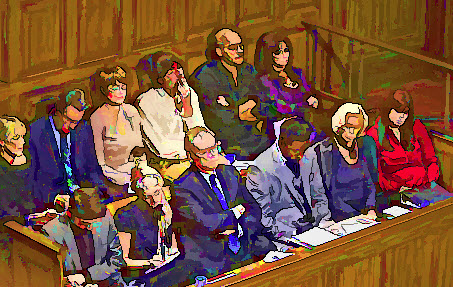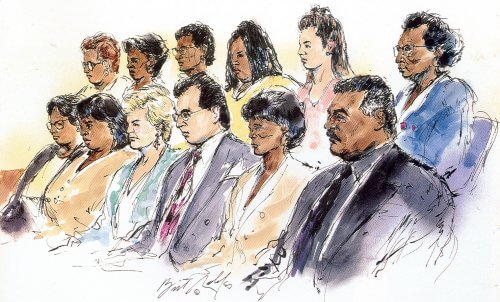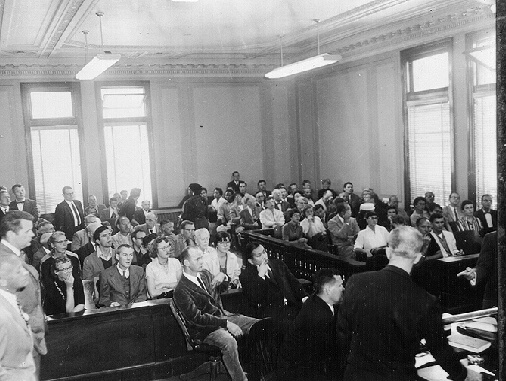
12 Persons Required to Serve on Texas Felony Jury Trial – Fort Worth Trial Lawyers
 A felony jury trial in Texas requires 12 jurors (with limited exceptions). The defense can waive that requirement under certain circumstances, and jurors can be excused under certain circumstances. But generally, a felony jury panel must have 12. Below, we discuss a case in Denton County where the jury started with 12 and then went to 11 because a juror could not understand the English language well enough to serve.
A felony jury trial in Texas requires 12 jurors (with limited exceptions). The defense can waive that requirement under certain circumstances, and jurors can be excused under certain circumstances. But generally, a felony jury panel must have 12. Below, we discuss a case in Denton County where the jury started with 12 and then went to 11 because a juror could not understand the English language well enough to serve.
Stillwell v. State – Opinion issued by the 2nd District Court of Appeals (Fort Worth) on May 28, 2015
Appellant, Eben Stilwell was convicted in the 367th District Court in Denton County by an 11-person jury of indecency with a child and sentenced to 12 years in prison. A jury of 12 was originally empaneled but after three days of testimony, one of the jurors came forward and informed the court that he was having difficulty understanding the proceedings. The juror primarily spoke Spanish and was having difficulty following the proceedings because they were in English.
During the conversation between the judge and the juror, the juror repeatedly said “I understand a little bit” or “I don’t understand.” Both the defense and state agreed that the juror did not adequately understand the English language and was not completely following what was going on in the courtroom.
The prosecution and defense disagreed, however, as to the legal basis for the juror’s removal. The state urged that juror be deemed “disabled” under Tex.Code Crim. Proc. Ann. art. 36.29(a), which would allow the trial to proceed with 11 jurors over defense objection. The defense argued that because the juror was never able to serve, he was disqualified and a trial using 11 jurors could only proceed with the defendant’s consent. The defendant did not consent to continuing the trial with only 11 jurors. The trial court followed that state’s recommendation and dismissed the juror as disabled, continuing the trial with only 11 jurors.
The 2nd District Court of Appeals (Fort Worth), Justice Sudderth writing the opinion for the court, held that the court could have allowed the juror to remain on the jury because the right to have him excluded due to his inability to understand English had been forfeited. It is always the attorneys’ duty to determine that capability and fitness of the jurors during voir dire. Neither party inquired as to ability to understand the English language.
But, once the court determined that the juror should be dismissed, consent of the defendant was required to proceed with 11 jurors. Because appellant did not agree to proceed with 11 jurors, a mistrial was required. The lower court was reversed.
Fort Worth Criminal Trial Lawyers
If you or a loved one have a criminal case in Fort Worth, you need to seek the best criminal defense lawyer to represent you and protect your rights at trial. Call our attorneys today for a Free Consultation of your case.


 Every level of criminal offense in Texas has a corresponding punishment range for the jury to consider. With the exception of enhancements or other minor differences, the Texas punishment ranges are as follows:
Every level of criminal offense in Texas has a corresponding punishment range for the jury to consider. With the exception of enhancements or other minor differences, the Texas punishment ranges are as follows:
 “I want a hamburger…no, a cheeseburger.”
“I want a hamburger…no, a cheeseburger.”
 The Sixth Amendment of the United States Constitution guarantees an accused the right to a public trial in all criminal prosecutions.
The Sixth Amendment of the United States Constitution guarantees an accused the right to a public trial in all criminal prosecutions.
 After the defendant was convicted in the case of
After the defendant was convicted in the case of 
 If a criminal defendant takes the stand during trial on the merits and denies culpability, but then, after being convicted, chooses not to testify during the punishment phase of the trial, may the prosecutor comment during closing that the defendant has “not taken responsibility for the crime?”
If a criminal defendant takes the stand during trial on the merits and denies culpability, but then, after being convicted, chooses not to testify during the punishment phase of the trial, may the prosecutor comment during closing that the defendant has “not taken responsibility for the crime?”
 The general rule is that the defendant is to be tried only for the offense charged, not for any other crimes or for being a criminal generally. However, evidence of extraneous acts of misconduct may be admissible if (1) the uncharged act is relevant to a material issue in the case, and (2) the probative value of that evidence is not significantly outweighed by its prejudicial effect. Because the propensity to commit crimes is not a material fact in a criminal case, Texas Rule of Evidence 404(b) explicitly prohibits the admission of uncharged acts to prove conduct in conformity with a bad character.
The general rule is that the defendant is to be tried only for the offense charged, not for any other crimes or for being a criminal generally. However, evidence of extraneous acts of misconduct may be admissible if (1) the uncharged act is relevant to a material issue in the case, and (2) the probative value of that evidence is not significantly outweighed by its prejudicial effect. Because the propensity to commit crimes is not a material fact in a criminal case, Texas Rule of Evidence 404(b) explicitly prohibits the admission of uncharged acts to prove conduct in conformity with a bad character.
 As I was perusing my typical news sources this morning, I came across
As I was perusing my typical news sources this morning, I came across 
 Blackshear v. State (link not working for now) 14th District Court of Appeals (Houston) 2011.
Blackshear v. State (link not working for now) 14th District Court of Appeals (Houston) 2011.





